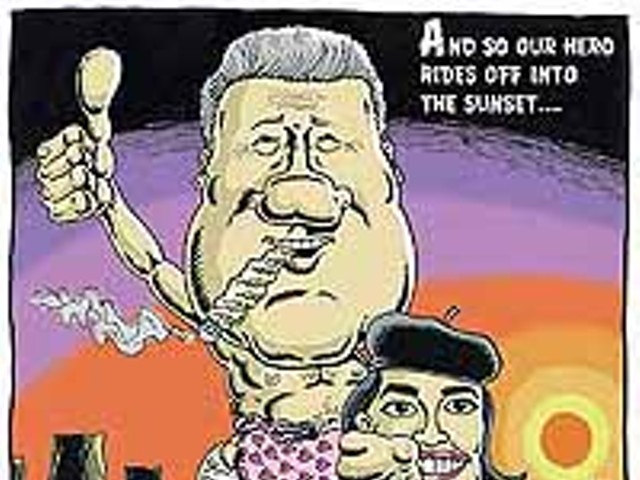Thousands of years ago, sculptors and painters adorned Hindu temples and shrines with beautiful flowerlike, triangular and double-pointed oval images, symbolizing the fleshy flaps and folds of female genitalia. These symbols, called yoni, were worshiped as far more powerful than the male counterpart, the lingam. This idea carried over into Tantrism, a system of worship that holds as its central tenet the inability of a man to reach spiritual fulfillment except through sexual or emotional union with a woman’s superior spiritual energy.
What in the hell happened?
Some trend theorists might claim feminism is unnecessary in the 21st century. There’s been a politically correct backlash in recent years and a more relaxed “sense of humor” when it comes to sexuality and sexism, leading to skewed and divided ideas of empowerment. Have you heard the one about Raquel Welch, labia reduction and the guy in the burn unit who thanked her for the ears? Meanwhile, violations and silencing of women continue to occur, proving that if a time ever does exist when feminism can be deemed useless, it certainly isn’t now.
Eve Ensler, a practicing feminist her entire life, has traveled the world interviewing women about their relationships with their bodies. In her most famous play, The Vagina Monologues, the biblically named writer put together stories from a diverse group of women, each one bluntly exploring a specific aspect of the vagina. Trading off between light-hearted, shocking and pit-of-the-stomach disturbing, the play covers hair, scents, masturbation, sex, orgasms, secretions, periods, birth, mutilation, rape, what we call vaginas, what they would wear if they got dressed, what they would say if they talked, etc. Acknowledging that vaginas do exist, it’s a reconnection of sorts, making us aware that vulvas are a part of women and sacred, connected to the mind and not a shameful thing.
You know, stuff we’re not supposed to talk about.
Since The Vagina Monologues publication in 1998, a small revolution has taken place across the country, leading to a slow leak into the mainstream. The V-Day Initiative, a movement to end violence toward women, grew from the book and now college groups perform the play on Valentine’s Day each year to standing-room-only crowds, raising awareness and funds for domestic violence programs. The first V-Days happened in New York, London and Los Angeles. In these performances, Ensler was joined by women such as Cate Blanchett, Glenn Close, Winona Ryder, Whoopi Goldberg, Marisa Tomei, Rosie Perez, Lily Tomlin, Calista Flockhart and others. In October, Donna Hanover, New York City’s first lady, participated. With the play now on tour, the Detroit performance at Second City features Lori Petty, Starla Benford and Sherri Parker Lee. It will benefit Haven, First Step, My Sister’s Place-Women’s Justice Center and Turning Point.
Ensler wrote the play because she heard women talking about their vaginas and what they said surprised her. What she found out was that women were really “hungry” to talk about them. “They had no context or place where they could do that. And that by talking about them, they made themselves more real, more present and more legitimate,” she says on the phone from New York.
“I have no idea what people are talking about when they say (it’s a bad word). It’s like saying, ‘Do you want to breathe?’ Well, no I’m not really fond of air.”
Do men ever approach her after shows saying that they are embarrassed or ashamed of their parts?
“No. No man has ever said that to me,” she says between near-fits of laughter. “Men have come up and said they were really moved and taken and they learned something, but no man has ever said they were embarrassed or ashamed of it before. In the years that I’ve done it, that has never occurred. I think penis is a world, oops, well, world and word we accept. We live in a penis world. Everything about this world is phallic.”
With The Vagina Monologues, Ensler hopes to foster real change. Language is a good start — and she hammers it into the audience. You’ll find the v-word 128 times within the play’s 106 pages, though Ensler doesn’t even like the term all that much. (Inga Muscio revealed the word’s etymology in her book, Cunt: “Vagina” originates from a word meaning “sheath for sword.”)
With the monologues, Ensler’s use of language is more of an examination of what the word is and why people are afraid to say it. (In most cases, we can assume it’s not because of the sword thing.) “Whatever it is, it’s the word we’ve got. I think it would be fantastic to come up with a more beautiful, delicious, all-inclusive word that included the vulva and the labia and everything, the whole package, but we don’t have that word at this point.”
In the play, her interviewees call it everything from a poonani to a coochi snorcher to a nappy dugout. Ensler doesn’t really have a preferred term, although she says she thinks about it “all the time!” She does admit in a surprisingly secretive voice that she likes the word yoni. I thought she might.
Melissa Giannini is the Metro Times music writer. E-mail her at [email protected]




